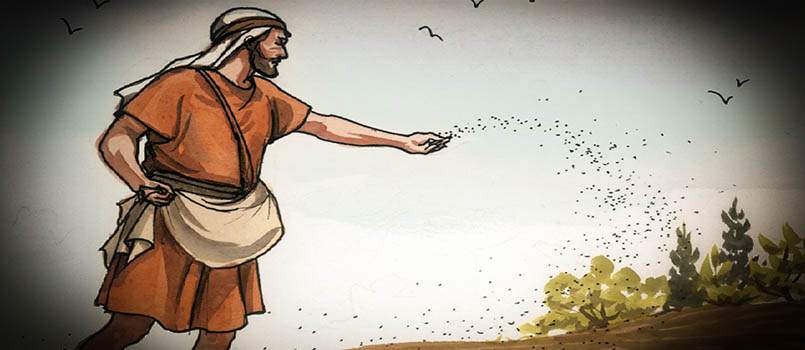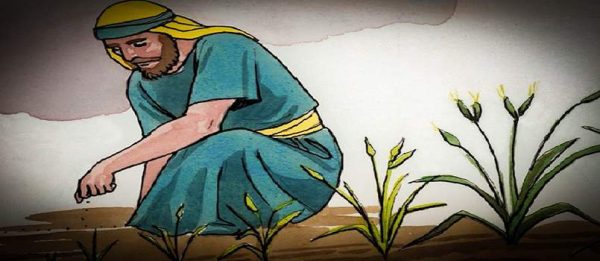1,248 total views
The Lord Is My Chef Sunday Recipe, Week XV-A, 16 July 2017
Isaiah 55:10-11//Romans 8:18-23//Matthew 13:1-23
Starting today we get into the heart of Jesus Christ’s preaching, the parables. In St. Matthew’s gospel account, chapter 13 constitutes a well-defined structure of a collection of parables referred to as “Discourse on Parables” from which we shall hear for the next three consecutive Sundays. A parable is a literary genre commonly used in almost every culture to teach important lessons about life; but, Jesus’ parables are the best known for they impart deeper realities of God Himself. From the French “parabolein” for “along the road” or “on the pathway”, parables by Jesus are simple stories rich in meanings that are sometimes not immediately evident. They require faith and openness of one’s heart and soul because these parables by Jesus actually speak of His mystery of person as well as of His Father.
On that day, Jesus went out of the house and sat down by the sea. Such large crowds gathered around him that he got into a boat and sat down, and the whole crowd stood along the shore. And he spoke to them at length in parables, saying: “A sower went out to sow. And as he sowed, some seed fell on the path, and birds came and ate it up… Whoever has ears ought to hear.” The disciples approached him and said, “Why do you speak to them in parables?” He said to them in reply, “Because knowledge of the mysteries of the kingdom of heaven has been granted to you, but to them it has not been granted. To anyone who has, more will be given and he will grow rich; from anyone who has not, even what he has will be taken away. This is why I speak to them in parables, because they look but do not see and hear but do not listen or understand. Isaiah’s prophecy is fulfilled in them, which says: You shall indeed hear but not understand, you shall indeed look but never see. Gross is the heart of this people, they will hardly hear with their ears, they have closed their eyes, lest they see with their eyes and hear with their ears and understand with their heart and be converted, and I heal them.”(Mt.13:1-4,9-15)
We have all heard and even memorized this first parable by Jesus, the Parable of the Sower. And here lies a recurring challenge of every parable: when we take it for granted because it is so simple and ordinary, always forgetting the power of God’s word that demands an intense listening on our part. Isaiah describes to us in the first reading the power of God’s word “like rain and snow that fall onto earth, watering the plants that bloom to produce seeds for sowing and food for eating.”(Is.55:10-11) It is a reminder pointing back to the creation story of Genesis when everything was created through the word of God that is totally other and always effective. A lot often, we take God for granted in our lives. We belittle prayers and Sunday Masses because we view them as so ordinary, so simple or, even old-fashioned. Ironically, when everything else fails in our life, then we go back to God, to prayers and the Eucharist and other sacraments, but still believing it is that easy and simple.
When we take God seriously and His words, we realize it is not so simple after all because it demands conversion as Jesus noted in quoting Isaiah: Gross is the heart of this people, they will hardly hear with their ears, they have closed their eyes, lest they see with their eyes and hear with their ears and understand with their heart and be converted, and I heal them.” To experience the power of God’s word, we have to crack it open like a nut that summons all the strength and energy of our body, calling us to prophetic living or witnessing. It is actually making – not waiting – the word of God to happen and be realized in us even if it would cost us our very lives like Jesus and the prophets who came before Him. This is the reason Jesus quoted from Isaiah not only to show the fulfillment of his prophecy but to show us the parable of the sower requires a life of total service and commitment to the Father like the prophets and later, like Him. To truly see with one’s eyes and truly hear with one’s ears according to Isaiah as mentioned by Jesus, we need to be converted and healed by God because the sowing of seeds continues on a daily basis. This is the mystery of the seed of the sower because it is both the person of Jesus Himself. Are we willing to be with Jesus Christ every day? Most of all, can we also be obedient unto death to His words?
During the late 70’s, my “jeprox” generation used to have an expression that I feel could illustrate to us this call to conversion to uncover the parable of Jesus and that is to make “sakay” or, ride like in a car. We used to say to get the meaning of something, “ sakay lang ng sakay, baby!”(Ride on baby, ride on!) To ride on the parable of Jesus is to follow His path of the Crucifixion, which is prayer and good works. We cannot remain on the sidewalks and just be mere spectators; we have to live out our lives in Christ by hitting the road with all the dust and potholes. Notice that in the parable, wherever the seed fell, it always sprouted into life but only those that fell on the good soil matured and bore fruit. The seed is always good because it is the Word of God, Jesus Christ; the problem is always with the kind of soil or the recipient why the seed would not mature and bloom. But a good soil is not enough for the seed to grow and bear fruit; farmlands and gardens have to be cultivated, plowing the soil for it to open and give space for the seed sowed upon. Are we willing to put into action the words of the scriptures or at least the words of our daily prayers? Likewise, can we have the discipline to listen daily to God?
This is where we have to make “sakay” or ride on the parable when Jesus demanded “Whoever has ears ought to hear” which is a call to listen attentively, to let the seed sink into our hearts and let it guide our lives. Problem with us in this age is we refuse to let God give a chance to work in us. Too often, we believe only matters matter that we hold only as true the things that can be experimented. How ironic that we sorely miss the very nature of the seed— that in its minuscule size we see, there also exists the potency of a huge and giant tree. On the other hand, there are some who simply want to be delighted and entertained by the word of God for the sheer purpose of enjoyment. Like Herod who ordered the arrest of John the Baptist but could not have him killed at the beginning because he loved listening to his preaching, these are the people who refuse to be plowed upon or broken and converted by the power of the word of God. Indeed in both cases, Jesus rightly noted that “they look but do not see and hear but do not listen or understand” because of hardness or closeness of hearts.
Two weeks ago I had to rush to an ENT clinic when an ear bud pushed a dirt deeper into my right ear. After the procedure when the doctor had found out I am a priest, he started to sound religious in explaining the very nature of our ears. According to him, God designed our ears to naturally flush out anything not needed inside our ears. As I drove back to the parish, I wondered how we do the opposite with our ears: we keep unnecessary things like chismis and negative things inside our ears and flush out the more essential ones like truth coming from the voice of God. And while praying over this parable this past week, I suddenly remembered my report about the “vestibular sense” in our Rational Psychology class in third year college under Mrs. Ellar in UST. Come to think of it that our sense of balance is inside our tiny ears. Have you not observed that whenever we lose balance in life, that is also when we refuse to listen to God’s voice speaking from deep within our hearts and through people who care and love us?
St. Paul perfectly said “that all creation is groaning in labor pains even until now; and not only that, but we ourselves also groan within ourselves as we await for the redemption of our bodies.”(Rom.8:22-23) Life indeed is a mystery with so many paradoxes and ironies often expressed in simple things like seeds and soil and sower. The parable of the sower is actually the parable of our life, of the call to simplicity as well as to hiddenness where God truly speaks to us. When we are able to listen to God speaking to us, that is when we begin to truly find and see Him too. A blessed and fruitful week to everyone!
Fr. Nicanor F. Lalog II
Parokya ni San Juan Apostol at Ebanghelista
Gov. F. Halili Ave., Bagbaguin,
Sta. Maria, Bulacan




















